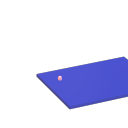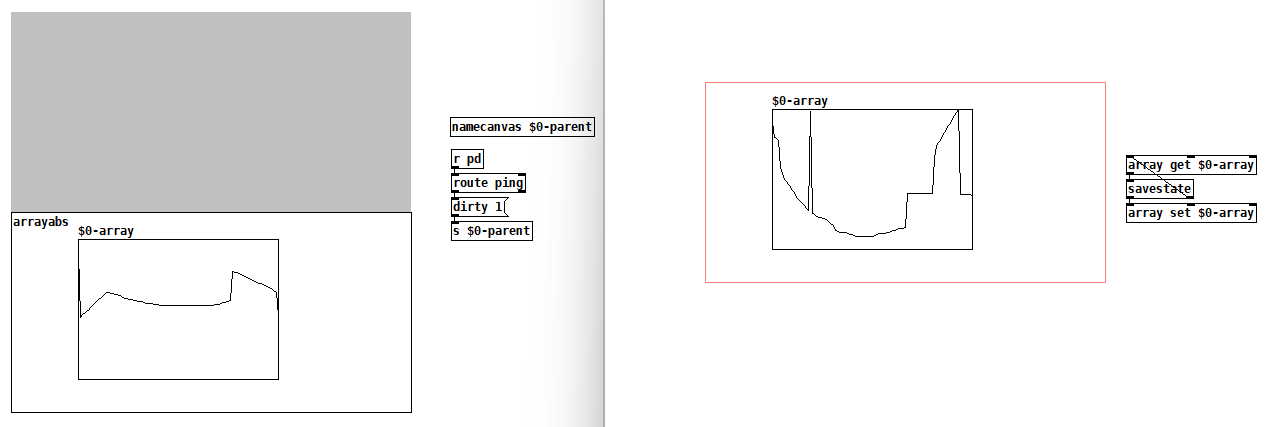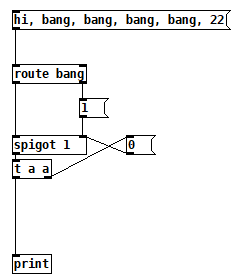-
 lacuna
posted in technical issues • read more
lacuna
posted in technical issues • read more[osc~] [osc~] | | [max~ ]or with [min~], this switches the signals themselfs
-
 lacuna
posted in technical issues • read more
lacuna
posted in technical issues • read moreDecision of using control-rate or signal-rate basicly depends on where the trigger is coming from: signal-rate or control-rate?
(this is the short answer)I'm not clear on what value "le+23" is meant to indicate.
1e+23 is just a very big number (+ - 1e+32 is Pd's 32-bit single precision space). By multiplying the output of [rzero~ 1] to extremes, then clipping with [clip~ -2 0], turns it into a boolean, either -2 or 0.
Here is @jameslo's example of sigrate flipflop https://forum.pdpatchrepo.info/topic/13918/signal-logic-clocks-division-and-sequences/4
rpole~version should be drop-in replacement.I tried those
please share your patch
-
 lacuna
posted in technical issues • read more
lacuna
posted in technical issues • read moreNow looking at this years later, in hope that I don't miss the point again:
@ddw_music said:
This naïve approach to timestamps will work only if there is ever only one pending message. If the sender spits out 5 OSC messages with different future timestamps, only the last message will be available in [list store].
The reason for this is that there are only one [delay] and [list store] for several messages.
Haven't tested but I think this works: clone [del] and [list store], and feed the clone with|
[list prepend next]
|
[list trim]
|
EDIT: looking further, haven't tried this neither, but in osc lib, which contains [unpackOSC], is also [pipelist].
-
-
 lacuna
posted in technical issues • read more
lacuna
posted in technical issues • read moreinlet~ helpfile

Connect [f $1] to [inlet~].
Or use [sig~ $1] ? Not sure what you want to do? -
 lacuna
posted in technical issues • read more
lacuna
posted in technical issues • read more
Try to undestand the patch and read the manual, esp. 2 control.examples / 08.depthfirst.pd -
 lacuna
posted in technical issues • read more
lacuna
posted in technical issues • read moreVanilla's Changelog (don't know if this is complete):
https://msp.ucsd.edu/Pd_documentation/resources/chapter5.htmYou probably used Pd-Extended 15 years ago!?
Extended is discontinued, but you can add libraries to Vanilla.
There is 'Deken' now: Pd-menu > help > find externals online .
There is also this website of Deken, which helps to find missing objects: deken.puredata.info
So [init] is part of IEMlib.
But is also easily replaceble as Vanilla abstraction:[loadbang]
|
[args 0(
|
[pdcontrol]
|
[list trim] [inlet]
|/
[outlet]pdcontrol did not exist 15 years ago.
All Vanilla objects: help > list of all objectsAnd there is the compatibility message to revert Vanilla to an old version:
[;pd compatibility 0.52(see message-helpfile > pd-messages
There have been many many improvements to Pd, intelligent patching for example.
And documentation also improved a lot!It has been a big shift when Pd went from 32 to 64 bit. In this transition some libraries have not been updated and I think it has been that time where Extended discontinued. You can still download it and run your old patches there ...
EDIT: more on finding externals or abstractions:
https://forum.pdpatchrepo.info/topic/15770/harmonic-amplification/4 -
 lacuna
posted in technical issues • read more
lacuna
posted in technical issues • read more@jamcultur I can reproduce this. Feels like a bug but I think it is the nature of abstractions saving confilicting with the array saving.
As workaround we can do our own array saving with [savestate]

arrayabs.pd
arrayabsopenthis.pd -
 lacuna
posted in technical issues • read more
lacuna
posted in technical issues • read more@Balwyn said:
anything else opens the spigot
would be this:

in your patch only floats open the spigot
